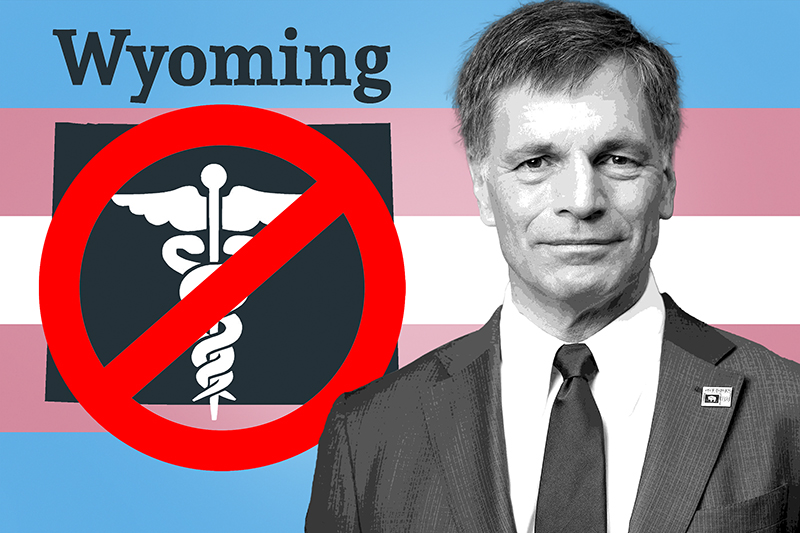Maryland Governor Signs Trans Health Equity Act
Bill requires Medicaid to cover gender-affirming treatments deemed medically necessary by a patient's medical provider.

Maryland Gov. Wes Moore (D) has signed a law requiring Medicaid to cover the costs of medically necessary gender-affirming care for low-income transgender residents.
The “Trans Health Equity Act” removes prohibitions on what types of transition-related treatments can be covered by Medicaid, enabling lower-income transgender residents to obtain coverage for medically necessary care.
Among the types of treatments that Medicaid can cover are: hormone therapy; puberty blockers; hair alterations; voice therapy; alterations to various body parts designed to match someone’s exterior with their gender identity; laser treatment for scars from gender-affirming surgery; fertility preservation procedures, such as sperm banking or egg freezing; and other treatments designed to suppress the development of endogenous secondary sex characteristics.
Under the bill, any gender-affirming treatments that have been prescribed to a transgender patient in accordance with current clinical standards of care and have been deemed medically necessary must be covered by Medicaid.
The bill prohibits categorical denials of coverage for certain treatments, and attempts to deny treatments for gender dysphoria on the grounds that such procedures are “cosmetic.”
The bill largely leaves the determination of whether procedures are needed to patients and their medical providers and allows Medicaid dollars to be used to cover gender-affirming treatments for Maryland residents under the age of 18, if their parents and medical providers recommend such interventions.
The bill stands in direct opposition to actions taken by Republican-led states, whose legislatures or governors have sought to ban gender-affirming treatments for minors, and who have sought to bar Medicaid dollars from being used for any transition-related treatments — even in the case of legal adults who have been recommended to receive such treatments by their primary health care provider.
The Human Rights Campaign estimates that 29 bills seeking to ban gender-affirming treatments — mostly for youth, though some seek to ban Medicaid and private insurers from covering transition-related procedures — have been passed into law this year.
“We should not be in the business of telling low-income or impoverished people that they don’t deserve access to the same level of care that every other Maryland resident has access to,” Del. Kris Fair (D-Frederick Co.), the chair of the Maryland LGBTQ+ Caucus, told The Washington Post. “Current political environments across the country are pushing back against the idea that people have the right to identify as transgender. This will simply reaffirm Maryland’s commitment to its trans community.”
Legislative analysts have estimated that the change will impact roughly two dozen people per year, for whom Medicaid is their primary insurer.
Republicans in the Democratic-dominated General Assembly complained that some gender-affirming treatments or procedures offered to the transgender community, such as fertility services, are unavailable to other recipients, such as cancer patients.
Others objected to the host of other treatments that fall under the umbrella of “medically necessary care” when treating gender dysphoria. Del. Mark Fisher (R-Calvert Co.) even called gender-affirming treatments “mutilation” and objected to using taxpayer dollars to cover the cost of them.
When the bill was debated in the House of Delegates back in March, Del. Lauren Arikan (R-Harford Co.) challenged arguments made by supporters that access to gender-affirming care reduces suicidal ideation, questioning the data behind such arguments, and predicted that some people, especially minors, who pursue irreversible treatments may one day experience regret.
Moore, who signed the bill into law along with other measures protecting reproductive rights and creating an adult-use cannabis market, cast all three measures as protecting individual freedoms.
He previously told members of the LGBTQ+ Caucus that he saw the Trans Health Equity Act as a civil rights issue, rejecting the idea that the state has a right to mandate how people identify and what medical treatments they can access.
“Here in Maryland we are committed to righting the wrongs of the past and protecting the rights of all Marylanders in the future,” Moore said in a statement. “As long as I am governor, I will fight with everything I’ve got to ensure we’re creating a safe, equitable, and prosperous home for every Marylander.”
Support Metro Weekly’s Journalism
These are challenging times for news organizations. And yet it’s crucial we stay active and provide vital resources and information to both our local readers and the world. So won’t you please take a moment and consider supporting Metro Weekly with a membership? For as little as $5 a month, you can help ensure Metro Weekly magazine and MetroWeekly.com remain free, viable resources as we provide the best, most diverse, culturally-resonant LGBTQ coverage in both the D.C. region and around the world. Memberships come with exclusive perks and discounts, your own personal digital delivery of each week’s magazine (and an archive), access to our Member's Lounge when it launches this fall, and exclusive members-only items like Metro Weekly Membership Mugs and Tote Bags! Check out all our membership levels here and please join us today!






















